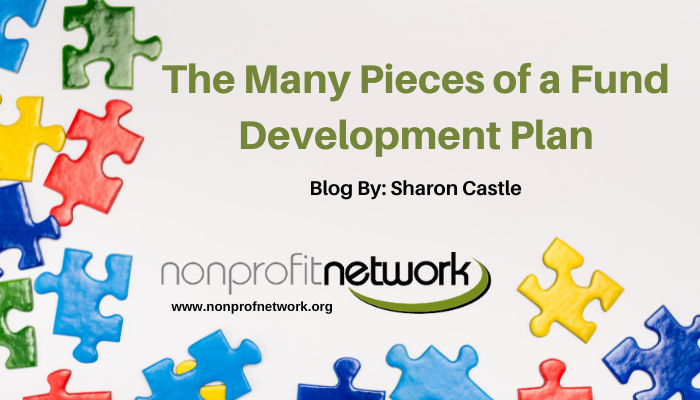

Sharon Castle
Capacity Builder
I’m not going to sugarcoat it; fundraising is tough. Been there, done that, and I continue to do it. Let’s face it, there’s a reason many of us describe fundraising as “the oldest profession.” It has been around a long time and not going to go away anytime soon. I have great respect for Executive Directors, Development Directors, Board members, Staff and Volunteers who understand and actively engage in fundraising for their nonprofit organizations.
Alas, each of us has a responsibility to play a role in philanthropy: acting as an ambassador and sharing positive aspects of how the community is benefiting from the organization’s activities with friends, relatives and coworkers; being part of a team of solicitors and participating in well developed “asks”; making the public feel welcome at events or when they making an on-site visit; or making a personal gift, something we all should be doing at least once annually.
We are all capable and responsible for supporting the development and sustainability of philanthropy within the organizations in which we choose to be involved.
Embracing John D. Rockefeller’s philosophy is an excellent start:
“Never think you need to apologize for asking someone to give to a worthy objective, any more than as though you were giving him an opportunity to participate in high-grade investment. The duty of giving is as much his as the duty of asking yours. Whether or not he should give to that particular enterprise, and if so, how much, it is for him alone to decide.” – John D. Rockefeller
But before you can execute Rockefeller’s advice to “ask”, you need to craft a well-thought-out strategy. While each organization has unique strengths and challenges to overcome or draw upon, the fundamentals of fundraising remain consistent.
Your fund development plan should cover all the bases, including:
- Supports the overall organizational strategic plan
- Developing and knowing how to articulate a strong case for support
- Writing effective direct mail appeals
- Adding new prospective donors and stewarding current donors
- Capturing motivational stories to share about your organization’s impact (or feeding the soul as I like to say)
- Identifying priority donors
- Evaluating special events (are you fundraising, friend raising, or both)
- Involving program staff in the development process
Indeed, these are all necessary pieces in the puzzle of not only a strong development program, but a strong organization as well.
To that end, there are a multitude of opportunities and trainings to help you learn best practices and sharpen your tools when it comes to fundraising. Take advantage of these activities to learn from folks who have been in the field. Plan and use the time to get among colleagues to stretch your mind by sharing and listening to others’ fundraising successes and failures - Yes, there will be failures, but we will hopefully gain learning from our mistakes. And when you can, role play and practice solicitations regularly to stay on top of your game.
Join us at our next event – Fundraising Strategies for Grassroots Organizations on April 3rd on Zoom at 9 AM ET and if you’re looking for more advanced professional development that will truly make you and your organization better you can check our upcoming event calendar or request to speak with a consultant by clicking here.
Want more? Click here to sign up for our weekly e-newsletter. Each week you'll get a link to the most recent news, workshops, and blog post. We promise to respect your time and will not flood your inbox. We only send one newsletter email each week and when any timely and important announcements need to be made.

